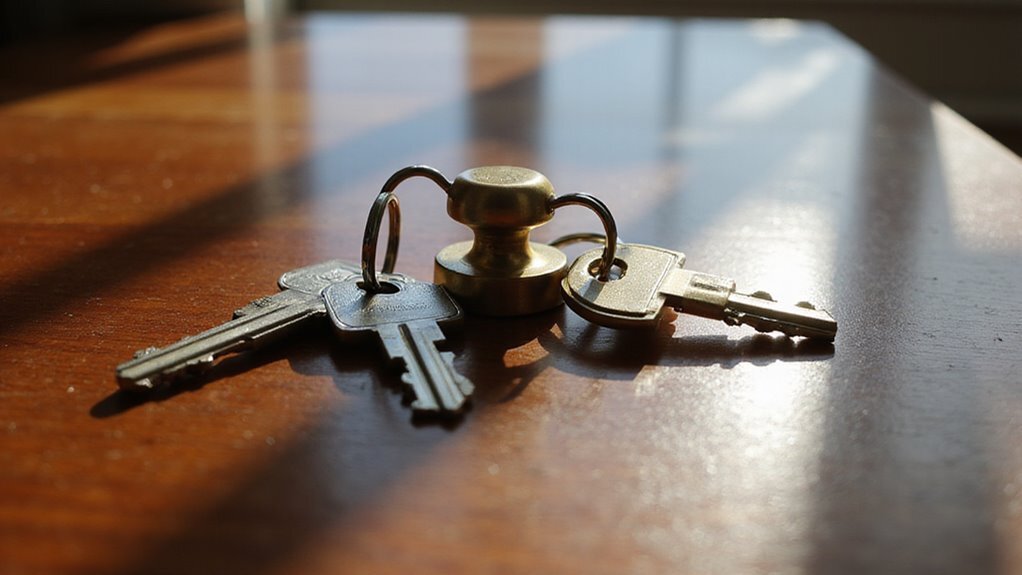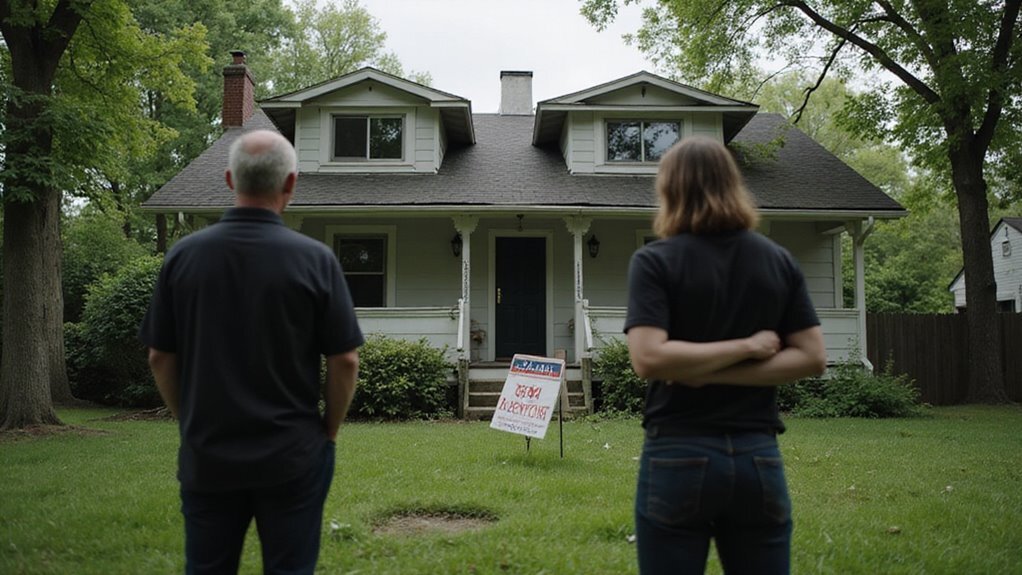Trapped in a joint ownership nightmare with an uncooperative co-owner blocking your home sale? Joint property ownership creates unexpected complications when relationships sour or priorities diverge. Without proper legal knowledge, you might face costly court battles and prolonged property limbo. Understanding your specific ownership rights provides clear pathways to resolution even without full cooperation.
In Kentucky, selling a jointly owned house requires consent from all co-owners regardless of circumstances. Your specific ownership type—Joint Tenancy, Tenancy in Common, or Tenancy by the Entirety—determines your legal options and limitations. While you cannot unilaterally sell the entire property, alternatives exist.
In this blog I will explore everything about selling jointly owned property when co-owners refuse cooperation.
Key Takeaways
- Kentucky law requires consent from all co-owners before selling a jointly owned property.
- Tenants in common can sell their individual share without permission, but not the entire property.
- Partition lawsuits can force the sale of jointly owned property when co-owners cannot agree.
- Court orders during divorce proceedings may permit selling without both spouses’ consent.
- Forcing a sale without proper consent can result in civil liability and significant legal expenses.
Can You Legally Sell a House Without Joint Owner Consent?

No, you can’t legally sell a jointly owned house without your co-owner’s consent. Kentucky law requires all property owners to agree to the sale. This protection prevents one owner from acting against others’ interests.
You have two main options when facing resistance. First, try to get your co-owner to sign the deed willingly.
Second, file a partition action to request court intervention. These legal steps can help resolve deadlocked situations.
You may sell only your portion of ownership independently. However, finding buyers for partial ownership is difficult. Most potential buyers want complete control of the property they purchase.
What Is Joint Property Ownership?

Joint property ownership in Louisville typically comes in three forms: joint tenancy, tenancy in common, or tenancy by the entirety.
Each ownership type carries distinct rights and limitations that directly impact your ability to sell—for instance, joint tenants can’t sell without consent while tenants in common can sell their interest independently.
Understanding your specific ownership structure is crucial when considering a property sale, as Kentucky law generally requires all co-owners to agree unless you pursue legal partition through the courts.
Types of Joint Ownership
Louisville property owners share real estate in three main ways. Joint Tenancy includes right of survivorship and requires all owners to consent before selling.
Tenancy in Common allows each owner to sell their individual share without permission from others.
Tenancy by the Entirety exists only for married couples and provides protection against individual creditors.
Your deed specifies which type applies to your situation. The ownership classification determines your selling rights and restrictions.
As a result, you should verify your ownership status before listing property. Many owners consult real estate attorneys to clarify their legal position before proceeding with a sale.
Rights and Responsibilities of Co-owners
Co-owners share specific legal rights that impact property sales decisions. Different ownership types determine your selling authority.
Joint tenants must have unanimous consent to sell the entire property. Tenants in common can sell their individual share without approval from others.
This distinction matters when planning your exit strategy. Your ownership documents specify which arrangement applies to your situation. Kentucky law requires all co-owners to agree for a complete property sale.
Court intervention becomes necessary when co-owners disagree about selling. Furthermore, the court may order property division or sale if no agreement is possible.
Legal Implications of Shared Titles
Kentucky property owners need consent from co-owners before selling shared property. Joint tenancy requires all owners to agree and includes automatic right of survivorship.
Tenants in common can sell only their portion without permission. Married couples hold tenancy by entirety with special legal protections.
Co-owner disputes often lead to partition actions. These court proceedings can force property sales when owners disagree.
The court divides proceeds according to ownership percentages. However, partition actions typically cost thousands in legal fees and damage relationships permanently.
Furthermore, partition sales rarely fetch full market value. Courts usually approve reasonable offers rather than optimal ones.
When Can You Sell Without the Other Owner’s Consent?

You can sell a jointly owned house without consent only in specific legal situations.
A partition lawsuit is the main option, where courts may order the property sold and divide proceeds between owners. The court becomes your solution when co-owners can’t reach agreement.
Additional exceptions include court orders during divorce proceedings. The death of a co-owner with joint tenancy survivorship rights also creates a pathway to sell.
Moreover, proven abandonment by a co-owner might provide legal grounds. In most cases, however, cooperative decision-making remains the simplest approach. Through these legal channels, difficult ownership situations can find resolution.
How to Sell a House Without Co-owner Agreement?

When your co-owner refuses to sell, you’ll likely need to pursue a partition action through Kentucky courts, which can legally force the sale of jointly owned property despite objections.
Before heading to court, consider negotiating a buyout or using mediation services to reach a mutually acceptable solution without the expense of litigation.
Regardless of your approach, you’ll need proper documentation—either both signatures on a deed for voluntary sales or court orders for forced sales—to legally transfer ownership in Louisville.
Seeking a Partition Action
A partition action forces the sale of jointly owned property when co-owners can’t agree. Kentucky courts authorize this legal remedy under KRS Chapter 381 when disputes become unresolvable.
You must file a formal petition with your local court to begin the process. The court will divide sale proceeds fairly between all owners. Legal expenses typically come from these proceeds before distribution.
Most partition cases resolve within 3-6 months, depending on case complexity. This option works as a last resort after other negotiation attempts fail.
It ensures you can sell your ownership interest despite objections from other parties. Courts generally prefer voluntary agreements but will intervene when necessary.
Buyout Negotiations
Buyout agreements offer faster and cheaper alternatives to partition lawsuits. You can save thousands in legal fees through direct negotiations with your co-owner. This approach resolves ownership disputes without court intervention.
Start with a professional appraisal to determine the property’s fair market value. Then present two clear options to your co-owner. Either you buy their share or they purchase yours. A small premium above market value often encourages cooperation.
Put everything in writing, including payment terms and transfer timeline. As a result, both parties understand their obligations.
Kentucky law requires specific documentation for property transfers, so have an attorney review your agreement. This precaution protects everyone involved.
Mediation and Legal Alternatives
Mediation should be your first step if buyout negotiations fail. A professional mediator helps resolve disputes while keeping relationships intact. This approach saves thousands in legal fees compared to court proceedings.
Legal options become necessary when mediation doesn’t succeed. Partition actions force property division or sale through court order. Declaratory judgments establish your legal rights to the property. Temporary court orders protect the property during ongoing disputes.
Furthermore, legal proceedings in Louisville typically require 4-6 months to complete. Despite the time investment, they provide clear solutions when co-owners refuse cooperation. The mediation route remains faster and more cost-effective in most situations.
Documentation Requirements
You need specific documents to sell property without co-owner consent in Kentucky. Both owners must typically sign the deed for a valid transfer.
Required documents include a court order from a partition action and proof of your ownership interest. You must also show evidence of attempts to resolve the dispute. Legal filings that establish your right to sell are necessary too.
Courts generally prefer co-owners to reach agreement before litigation. The partition process can take several months to complete depending on case complexity. Your attorney can help prepare these documents properly.
What Are the Risks of Forcing a Home Sale?

Forcing a home sale in Louisville without your co-owner’s consent will likely lead to costly legal battles through partition actions, often running into thousands in attorney fees and court costs.
You’ll face financial setbacks from both legal expenses and potentially unfavorable sale terms when courts determine the distribution of proceeds.
Your personal relationships may suffer permanent damage, as these adversarial proceedings frequently destroy family ties or friendships and create lasting animosity between former co-owners.
Legal Consequences
You can’t legally sell a co-owned home without consent. Attempting this may result in civil liability for misrepresentation and financial damages.
Courts often award legal fees to the wronged co-owner, typically exceeding $10,000. Any unauthorized sale could be invalidated completely.
Kentucky property rights receive strong legal protection. The consequences of improper sales can affect your finances for years afterward.
Therefore, consult with a real estate attorney who handles co-ownership disputes before taking action. With proper legal guidance, you can avoid costly mistakes and protect your interests.
Financial Implications
Partition lawsuits cost thousands in legal fees and court expenses. You’ll pay for attorneys, court filings, appraisals, and possibly a referee to oversee the sale.
Property division typically results in a 50/50 split regardless of your contributions. Forced sales often yield lower returns than cooperative ones.
Properties sold through court orders typically sell for 15-25% below market value. These discounts, combined with legal costs, significantly reduce your profit margin.
Additionally, damaged relationships may lead to counterclaims from co-owners. Such complications extend the legal process and increase expenses further. Consider these financial drawbacks before pursuing a partition action.
Impact on Personal Relationships
Forced home sales often destroy personal relationships permanently. Trust breaks down immediately when you act against a co-owner’s wishes.
Children may suffer emotional trauma as families divide over property disputes. Your extended family could take sides, creating painful holiday gatherings for years.
Friends might choose sides in the conflict too. Your social circle may shrink significantly during this process. The Louisville community values strong relationships, making the isolation feel more intense.
Courts consider these relationship impacts when evaluating partition actions. They prefer all negotiation attempts be exhausted first.
The emotional damage typically lasts far longer than any financial benefits you might gain.
Special Circumstances That Affect Joint Property Sales
You’ll face unique challenges when selling jointly owned property during divorce, as courts often order sales regardless of one owner’s wishes.
If your co-owner dies, rights of survivorship may automatically transfer their ownership share to you, potentially simplifying the sale process.
When a co-owner abandons the property, you’ll need to provide sufficient evidence to the court before proceeding with a sale without their explicit consent.
Divorce Proceedings
Kentucky courts can order the sale of jointly owned property during a divorce without both spouses’ consent. This legal authority overrides normal property sale requirements through court-ordered divorce settlements.
The court has power to force property sales and distribute proceeds according to their final judgment. You won’t need your ex-spouse’s signature when you have a court order authorizing the sale.
Additionally, judges often set specific timelines for selling assets to ensure fair division. As a result, property division follows different rules during divorce than standard real estate transactions.
The divorce decree becomes the legal document that replaces traditional consent requirements. Furthermore, the court determines how to split proceeds based on equitable distribution principles.
Death of Co-owner
When a co-owner dies, the property transfer depends on your original ownership structure.
Joint tenants with rights of survivorship means you inherit the deceased’s share automatically. No probate is necessary in this case.
Tenancy in common requires the deceased’s share to pass through their will or intestacy laws.
Be careful with estranged spouses who might claim inheritance rights. Taking action without legal authority could violate property rights. Always check death certificates and court documents before selling.
Proper verification of ownership transfer is required by law. This protects you from potential legal complications later.
Abandonment Situations
No, you can’t automatically sell jointly owned property when a co-owner abandons it. You must seek court approval first. Kentucky law requires judicial intervention before proceeding with any sale.
Courts will only authorize sales when you prove complete abandonment, show reasonable search efforts, and demonstrate continued property maintenance.
This legal process protects everyone’s property rights while providing a solution for difficult situations.
Property abandonment creates ownership complications that can’t be solved through self-help methods. In most cases, a judge must review your evidence and determine if the abandonment justifies allowing a sale.
Furthermore, following proper legal channels prevents future disputes or claims from the absent owner.
What Options Do Distressed Homeowners Have?
When you’re caught in a contentious property situation, you’ll need to investigate multiple avenues to protect your financial interests.
Your options include working with cash home buyers who can close quickly despite ownership complications, pursuing traditional real estate sales with proper legal guidance, or seeking court intervention through partition actions.
Each path carries different timelines and cost implications, so weighing these factors against your urgent need to sell will determine your best course of action.
Cash Home Buyers Solution
Cash home buyers offer a quick exit from property co-ownership disputes. They purchase properties “as-is” with no repairs required, often closing within 7-14 days.
Professional buyers can navigate complex ownership situations while ensuring legal compliance.
You’ll receive less than market value but avoid costly property litigation and relationship damage. This trade-off makes sense for many co-owners. The guaranteed sale lets you move forward immediately.
Furthermore, these buyers typically work with attorneys to handle all paperwork properly.
The entire process eliminates the stress of unauthorized sale accusations. Without prolonged court proceedings, you can quickly resolve ownership conflicts and start fresh.
Traditional Real Estate Route
The traditional real estate market can work for distressed homeowners with co-ownership problems. Your first step is understanding your property deed type.
In Kentucky, joint tenancy properties need all signatures for a sale, while tenancy in common lets you sell your portion only.
A real estate attorney specializing in ownership disputes should review your case before listing. They’ll explain your options clearly.
These professionals can guide you through partition actions when needed. Such legal processes might force a property sale if negotiations fail with your co-owner.
Furthermore, the court system offers solutions when reasonable agreements aren’t possible.
Legal Intervention Options
Courts can resolve co-ownership disputes when negotiations fail. Three main options exist to protect your property investment.
Partition actions force the division or sale of jointly-owned property. The court divides proceeds fairly among all owners.
Judicial title transfers resolve disputes about who legally owns the property. This process clarifies ownership rights when documentation is unclear.
Court-mediated buyouts allow one owner to purchase another’s share under supervised terms. These solutions cost money but typically less than remaining stuck in joint ownership.
Each option provides a clear exit strategy. Your financial interests stay protected even when communication with co-owners has broken down completely.
Conclusion
Selling a jointly-owned house without consent presents significant challenges for property owners. The ownership structure determines your available options in such situations. If negotiation fails, legal remedies like partition actions may become necessary. Always consult with a real estate attorney before making any decisions.
We at Kentucky Sell Now understand the stress of property co-ownership disputes. We buy houses in Louisville and across other cities in Kentucky State. Our team specializes in resolving complicated ownership situations with fair, fast solutions. We can evaluate your property and present a straightforward offer regardless of ownership complications.
If you’re struggling with an uncooperative co-owner, we encourage you to contact us today. We have helped numerous Kentucky homeowners escape difficult joint ownership arrangements. Our process eliminates the need for lengthy court battles or costly legal fees. We provide a simpler path forward when selling your jointly-owned property seems impossible.

